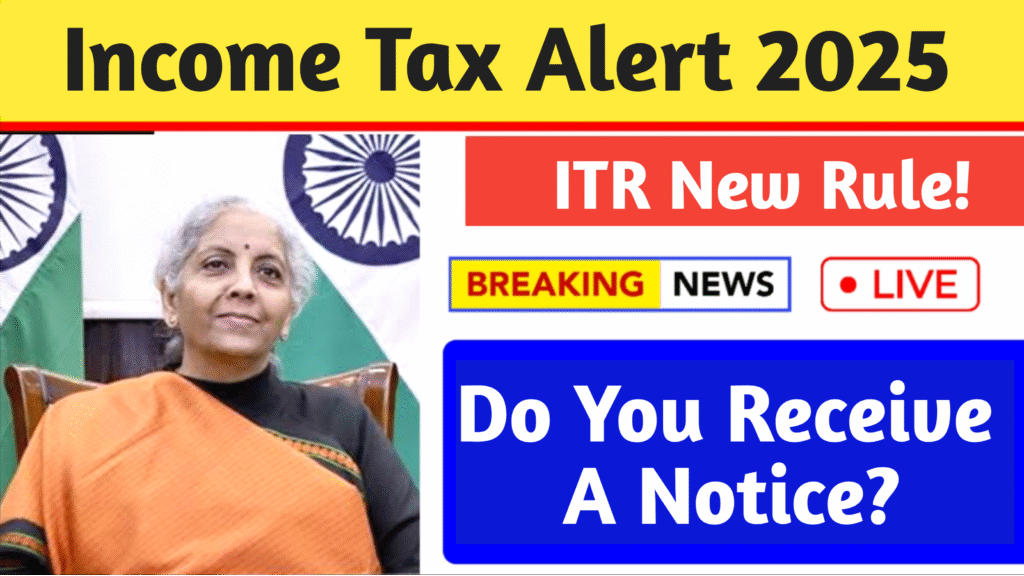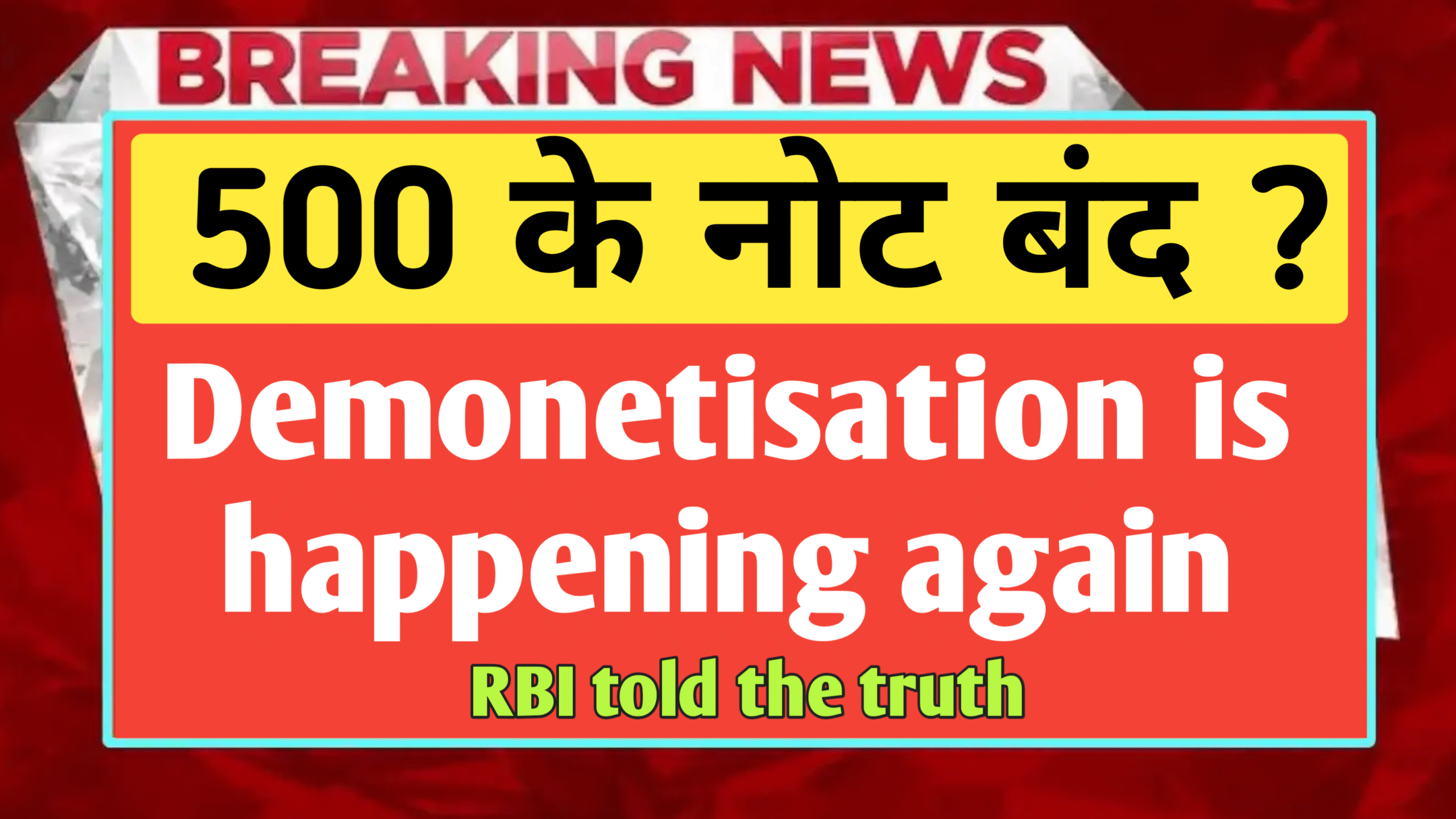Income Tax Alert :- In today’s digital era, a large portion of financial transactions takes place online. Yet, cash deposits into bank accounts continue to be a common practice for savings, business needs, or personal finance. While depositing cash into a bank account may seem routine, it comes with specific limits and legal implications under India’s Income Tax Act.
If you exceed these limits, it can trigger an alert to the Income Tax Department (ITD), which could result in receiving a notice for further inquiry. Therefore, understanding the applicable rules and thresholds is essential for every account holder in India.
What is a Cash Deposit According to the Income Tax Department?
A cash deposit refers to any instance where physical money is deposited into a bank account. This may include:
- Depositing cash at the bank counter.
- Cash deposited through an ATM.
- Money transferred in cash via third parties.
- Repeated small deposits made in a single day or across different bank branches.
Note that depositing money through cheques or electronic transfers is not considered a cash deposit under this context, although these too are monitored for large sums under separate guidelines.
In today’s digital banking infrastructure, all transactions—big or small—are digitally recorded, leaving very little scope for hiding cash movements from tax authorities.
Annual Cash Deposit Limit Under Income Tax Rules
As per Section 114B of the Income Tax Act, 1962, if you deposit ₹10 lakh or more in cash in a savings account within a single financial year, it may trigger a red flag.
Key Points:
- This ₹10 lakh limit applies across all your savings accounts combined, not separately for each bank.
- Depositing ₹4 lakh each in three different bank accounts still totals ₹12 lakh—crossing the permitted threshold.
- Once this limit is breached, banks are required to report it to the Income Tax Department.
This regulation is part of efforts to prevent money laundering, tax evasion, and the circulation of unaccounted cash or black money.
When Does the Income Tax Department Send a Notice?
If your annual cash deposits exceed ₹10 lakh, you are likely to receive an Income Tax notice under the e-verification scheme.
The notice will typically ask:
- Source of funds deposited.
- Valid documentation such as salary slips, sale deeds, business receipts, or gift declarations.
If the taxpayer fails to respond or provides unsatisfactory information, the department may:
- Treat the unexplained amount as unaccounted income.
- Impose penalties and interest.
- Initiate a detailed audit or legal action in serious cases.
How the Tax is Calculated on Cash Deposits
Let’s consider an example:
- Suppose your declared annual income is ₹13 lakh.
- You receive ₹10,000 interest from your bank account.
- Your total income for the year becomes ₹13,10,000.
According to the new tax regime in India (FY 2025-26):
- No tax is payable on income up to ₹3 lakh.
- Income above that is taxed in slabs (5%, 10%, 15%, etc.).
However, if you deposit ₹15 lakh in cash and cannot prove its legitimate source, the income tax authorities may treat it as undisclosed income, and levy:
- Regular income tax on the amount.
- Up to 200% penalty on the tax due.
- In some extreme cases, additional prosecution may follow.
What Triggers Income Tax Scrutiny?
Common scenarios that may attract attention include:
- Frequent small cash deposits to avoid the ₹10 lakh limit.
- Deposits made in multiple branches on the same day.
- Cash received from unknown or unverifiable sources.
- Depositing cash that doesn’t align with your declared income profile.
Modern AI-based systems used by the ITD and financial intelligence units analyze patterns of cash deposits to flag suspicious activities in real time.
What You Should Do if You Receive a Notice
Receiving a notice from the Income Tax Department isn’t always a cause for panic—if your income is legitimate and documented.
When replying to the notice:
- Submit income proof: salary, business invoices, or gift declaration.
- Attach PAN-linked transactions and property sale documents, if relevant.
- Maintain a transparent explanation of cash flow.
Being proactive with documentation will help close the inquiry quickly and avoid further action.
How to Avoid Notices: Best Practices for Taxpayers
To stay compliant and avoid triggering tax scrutiny, consider these precautionary measures:
✅ Do:
- Keep annual cash deposits under ₹10 lakh unless unavoidable.
- Maintain invoices and receipts for large deposits.
- Prefer digital payments and cheques for major transactions.
- File your ITR on time with correct bank details.
❌ Avoid:
- Depositing cash in parts to avoid the reporting threshold.
- Using someone else’s account to hide funds.
- Ignoring or delaying response to a tax notice.
If you need to deposit more than ₹10 lakh due to property sales, business income, or urgent needs—always have documentary proof ready.
Important Note on Gift and Emergency Cash Deposits
Occasionally, people may deposit large sums due to:
- Gifts received during weddings or family events.
- Emergency funds from relatives.
- Sale of ancestral property or land.
In such cases, you must:
- Keep gift deeds or affidavits.
- Ensure the donor’s PAN is quoted if above ₹50,000.
- Clearly show the transaction in your ITR filings.
Disclaimer
Also Read:
This article is for informational purposes only. Income tax laws may change with time. Always consult a certified tax professional or chartered accountant for personal financial decisions. Misreporting or ignoring income tax rules may lead to serious legal consequences.
Be Aware, Be Compliant
In 2025, the Income Tax Department is increasingly leveraging technology to monitor cash-based transactions. While cash deposits are not illegal, exceeding the threshold without explanation can raise red flags.
The best approach is to stay transparent, maintain documentation, and manage your deposits wisely. Remember: ignorance of the law is not an excuse, and compliance ensures peace of mind.



















2 Comments
bgj5r9
I truly appreciate this post. I’ve been looking all over for this! Thank goodness I found it on Bing. You’ve made my day! Thanks again